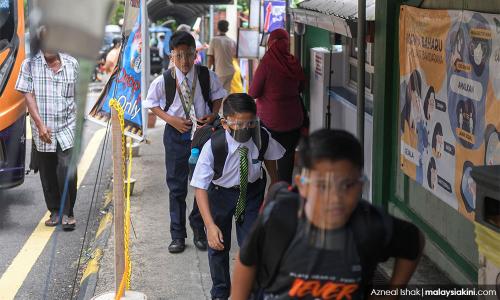MP SPEAKS | Vaccinate children before schools reopen
MP SPEAKS | I do strongly believe that it is time the federal government and the Special Committee on Covid-19 Vaccine Supply (JKJAV) considers reversing their decision to withhold the immunisation of children between the ages of 12 and 17 in our country.
The benefit of vaccination highly outweighs the risk especially in view of the emerging variants of concern that are more transmissible being reported across the world, including the Delta, Lambda, and Delta Plus variants.
This is in view of the opening of schools in less than a month and even the announcement by the prime minister on relaxing the movement controls including allowing parents who are fully vaccinated to travel across borders and states to meet with children below 18 years old.
While these parents may be vaccinated, they are travelling back to meet their children who are unvaccinated, which puts them at risk not only to get the disease, but also for their children to be a conduit to spread the disease to others, and even possibly develop new variants.
Data has shown that children and particularly adolescents can play a significant part in Covid-19 transmission, especially to high-risk groups including grandparents and other family members with comorbidities.
As we can see especially with the new variants, the disease pattern has changed, and younger people are getting infected with Covid-19 even here in Sarawak. Some children develop more severe symptoms, and in some extreme cases even result in death.
About 0.52 percent, or 15 of the 2,867 Covid-19 deaths reported in Malaysia as of June 1, occurred among children aged below 18 years.
While there are those who recover but we are still unsure of the effects of Long Covid on them. That is why the considerations are different now compared to before especially in view of the opening of schools and the relaxing of restrictions.
While I do understand the concern of side effects especially myocarditis (heart inflammation) reported especially in the USA, but such incidents are very small, 40 cases per one million doses of the Pfizer vaccine that was administered to males aged 12 to 29.
On top of that, young people who develop myocarditis from the mRNA vaccine mostly experience a mild illness and virtually all of them recover spontaneously or with minimal treatment. No deaths have thus far been reported.
However, the risk of boys aged 12 to 17 years old developing myocarditis and pericarditis from Covid-19 is estimated to occur at 876 per million. This is 13 times more than the risk of them developing it from the mRNA vaccines (67 per million).
For girls aged 12 to 17 years old, the risk of developing myocarditis and pericarditis from primary Covid-19 infection is 213 per million. This is 24-fold the risk of getting it from the mRNA vaccines (nine per million).
These figures speak for themselves. The benefits of vaccinating boys and girls aged 12 to 17 years old clearly outweigh the risks of myocarditis and pericarditis associated with the mRNA vaccines.
Besides mRNA vaccines, other vaccines including Sinopharm and Sinovac have also been tested in young people over the age of 12. Several countries, including the United States, Israel, and China, are now offering vaccines to this age group.
Thus far, the vaccines seem to be safe in adolescents, and some companies have moved on to carrying out clinical trials in children as young as six months old. In the United States, vaccines for those under 12 might be available later this year.
That is why I hope JKJAV will look through all the data again and realise that we need to protect our children even more. They consist of about 30 percent of our population and I strongly believe it is our responsibility to make sure they are protected as much as possible.
KELVIN YII is the Member of Parliament for Bandar Kuching and a medical doctor.
The views expressed here are those of the author/contributor and do not necessarily represent the views of Malaysiakini.
RM12.50 / month
- Unlimited access to award-winning journalism
- Comment and share your opinions on all our articles
- Gift interesting stories to your friends
- Tax deductable
